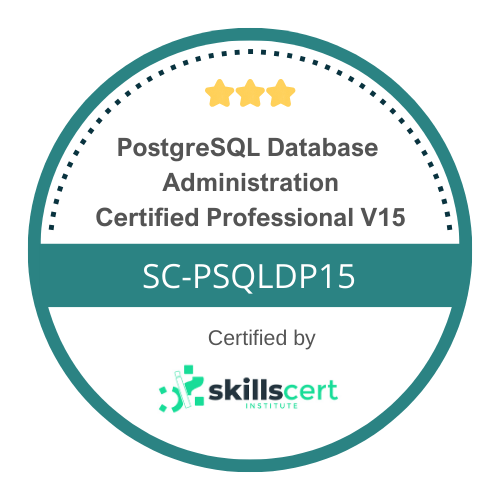0
PostgreSQL Database Administration Certified Professional V15 SC-PSQLDP15
$300.00
In stock
Product Details
PostgreSQL 15 Database Administration Certified Professional
Certification Code: SC-PSQLDP15
Advanced Skills Validation
The PostgreSQL Database Administration Certified Professional V15 (SC-PSQLDP15) certification validates a comprehensive set of advanced skills and competencies specific to PostgreSQL version 15. Based on the official syllabus, and incorporating high-level activities such as clustering, advanced backup methodologies, replication, and performance tuning, this certification confirms proficiency in the following areas:
1. Clustering
- Clustering Concepts: In-depth understanding of PostgreSQL clustering techniques, including master-slave, multi-master, and shared-nothing architectures.
- Cluster Implementation: Configuration and deployment of clusters using tools like Patroni, Stolon, or built-in logical replication.
- High Availability & Failover: Implementing automated failover mechanisms and conducting failover testing to ensure uptime.
- Data Consistency & Conflict Resolution: Managing data consistency across clusters and handling conflicts in multi-master environments.
2. Backup Methodologies (3-2-1-1 Rule)
- Backup Strategy Awareness:
- 3: Maintain three copies of the data.
- 2: Store them on two different media types.
- 1: Keep one copy offsite.
- 1: Ensure one copy is air-gapped or offline.
- Backup Techniques:
- Logical Backups:
Using
pg_dumpandpg_dumpall. - Physical Backups:
Using
pg_basebackupand other tools for live backups. - Incremental Backups: Using WAL archiving and tools such as Barman.
- Logical Backups:
Using
- Backup Integrity: Regular validation, restoration drills, and backup automation to guarantee data recoverability.
3. Replication
- Streaming Replication: Setting up and managing primary-standby configurations using PostgreSQL’s native streaming replication.
- Logical Replication: Enabling selective data replication and supporting cross-version upgrades.
- Monitoring & Maintenance: Tracking replication lag, performance, and health, and carrying out preventive maintenance.
- Failover & Conflict Management: Promoting standby nodes and resolving replication conflicts.
4. Performance and Tuning
- Query Optimization:
Analyzing queries using
EXPLAIN, query plans, and indexing strategies. - Server Tuning:
Adjusting PostgreSQL configurations (
postgresql.conf) for optimal performance under various workloads. - Resource Management: Efficient handling of CPU, memory, and I/O to eliminate performance bottlenecks.
- Monitoring Tools:
Utilizing tools such as
pg_stat_statements, pgBadger, and others for diagnostics. - Table Maintenance:
Executing
VACUUM, managing table bloat, and maintaining storage health. - Connection Pooling: Enhancing connection management with tools like PgBouncer to reduce latency and improve scalability.
5. Security and Compliance
- Advanced Security Settings: Enabling SSL/TLS encryption, LDAP integration, and enforcing strong authentication methods.
- Role-Based Access Control (RBAC): Defining fine-grained access policies to ensure least-privilege enforcement.
- Regulatory Compliance: Aligning database practices with standards like GDPR, HIPAA, and PCI-DSS.
- Auditing and Logging: Implementing robust tracking of data access and changes for compliance and forensic analysis.
Assessment Methods
- Theoretical Exam: A comprehensive written exam covering all essential and advanced PostgreSQL 15 topics.
- Practical Exam: A hands-on exam where candidates must configure, manage, and troubleshoot a PostgreSQL 15 environment.
- Scenario-Based Questions: Real-world situations testing applied knowledge in areas like disaster recovery, performance bottlenecks, and replication configuration.
- Performance Metrics Evaluation: Candidates are assessed on measurable outcomes such as query optimization, system availability, and cluster consistency.
This certification confirms a high level of technical expertise in PostgreSQL 15 administration, ensuring professionals are equipped to manage advanced PostgreSQL deployments in enterprise-grade environments.
PostgreSQL Database Administration Certified Professional V15 SC-PSQLDP15
Display prices in:
USD


